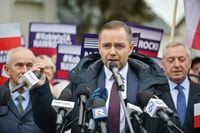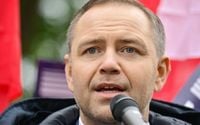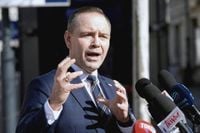As the Polish presidential election approaches, the spotlight has turned to Karol Nawrocki, the candidate from the Law and Justice party (PiS), following revelations about his real estate holdings. Just two weeks before the election, Nawrocki's claims during a debate have sparked controversy and raised ethical questions.
During a debate hosted by Super Express on April 28, 2025, Nawrocki asserted that he spoke for ordinary Poles who own only one apartment. His comments, made in response to a question from Magdalena Biejat, a candidate from the Left party regarding the housing crisis in Poland, were intended to position him as a relatable figure. However, journalists from Onet quickly uncovered that Nawrocki actually owns two apartments, contradicting his statements.
According to Onet's investigation, Nawrocki possesses a three-room apartment in Gdańsk, purchased in 2013 with a loan from Pekao bank, and a 28.5-square-meter studio apartment acquired in 2017 for cash. The latter was bought from an elderly neighbor, Jerzy Ż., who is currently residing in a state-run care home. Nawrocki had allegedly made a deal with Ż., promising to provide care in exchange for the property.
Adam Bodnar, the Minister of Justice, commented on the situation during a segment on TVN24's Kropka nad i, noting that the ethical implications of Nawrocki's actions are significant. "The entire story raises serious ethical doubts," Bodnar stated. He emphasized that Nawrocki could disclose his asset declaration at any moment and criticized him for hiding behind procedural excuses.
In the wake of the revelations, Nawrocki's spokeswoman, Emilia Wierzbicki, confirmed that the information about the two apartments was included in Nawrocki's asset declaration submitted to the Supreme Court. Yet, Nawrocki has opted not to release this declaration publicly, stating that the decision lies with the Supreme Court due to his position as the head of the Institute of National Remembrance (IPN).
As the campaign progresses, the controversy surrounding Nawrocki's housing situation has begun to overshadow other issues. A PiS insider remarked, "This issue is giving our opponents a reason to attack Nawrocki. It has become a dominant narrative in the campaign, overshadowing everything else." With the election date of May 18 approaching, the situation remains fluid, and party officials are concerned about the potential fallout.
Nawrocki's opposition to a proposed property tax has also come under scrutiny. He has argued that the tax would be detrimental to ordinary citizens, yet his own property ownership raises questions about his understanding of the housing crisis. During the debate, he failed to articulate a coherent strategy for addressing housing issues beyond simply opposing the tax.
Critics have pointed out that Nawrocki's actions reflect a broader pattern of behavior among some politicians who exploit the system for personal gain. Szymon Hołownia, a political opponent, highlighted this sentiment, stating, "When my neighbor fell ill, I helped him by getting his medicine. When Nawrocki's neighbor fell ill, he took over his apartment." This comment underscores the moral implications of Nawrocki's dealings and suggests that voters should be cautious in their choices.
Despite the mounting pressure, Nawrocki has maintained his stance, insisting that he has acted within the law. However, the circumstances surrounding the acquisition of the studio apartment raise questions about the integrity of the deal. Journalists have reported that Nawrocki provided Ż. with 12,000 zł to purchase a communal apartment, which was then transferred to Nawrocki under the pretext of providing lifelong care. This arrangement has been criticized as morally questionable, especially given that Ż. has been in a care home since April 2024.
Furthermore, the situation is complicated by Nawrocki's connections within the PiS party, which has a history of shielding its members from scrutiny. Critics argue that the party's solidarity often leads to a lack of accountability, as members protect one another from the consequences of their actions. This culture of impunity raises concerns about how Nawrocki would govern if elected president.
As the election date draws nearer, the implications of Nawrocki's housing scandal will likely continue to dominate the discourse. With voters increasingly aware of the ethical dilemmas surrounding political candidates, Nawrocki's credibility may be at stake. The outcome of this situation remains uncertain, but it serves as a reminder of the importance of transparency and accountability in politics.
In conclusion, the controversy surrounding Karol Nawrocki's real estate dealings highlights significant ethical concerns as Poland approaches its presidential election. As voters prepare to make their choices, they must weigh the implications of Nawrocki's actions against his political promises. The unfolding narrative will undoubtedly shape the election's outcome and influence public trust in political candidates.





